Final Jeopardy: Rock & Roll (10-27-14)
The Final Jeopardy question (10/27/2014), in the category “Rock & Roll” was:
A restaurant chain took its name from a British band’s fourth chart-topper, this 1967 song.
Current champ Matthew LaMagna has a 2-day total of $33,800. The first two challengers of the week are: Bill Albertini, from Toledo, OH; and Dori Phillips, from Salem, MA.
Round 1: Matthew found the Jeopardy! round Daily Double in “U.S. Cities” right before the first break under the $1,000 clue. He was in the lead with $2,600, $1,400 more than Dori in second place. He made it a true Daily Double and thought it was Williamsport. That was WRONG.
British General John Forbes named this city for a certain William the Elder. show
Dori finished in the lead with $5,000. Bill was second with $1,800 and Matthew was last with $1,200.
Round 2: Bill found the first Daily Double in “Last Complete Novel” under the $1,600 clue. He was in second place with $4,200, $3,200 less than Dori’s lead. He bet $3,000 and was quite relieved when he was RIGHT.
“Command Authority” (2013). show
Matthew found the last Daily Double in “Congress of Vienna” under the $1,600 clue. In third place with $2,000, he had $12,800 less than Bill’s lead. He bet $1,900 and he was RIGHT.
The Congress redrew the map of Europe; Prussia gained much of this area centered on a river, including Bonn. show
Bill finished in the lead with an unbeatable $14,800. Dori was next with $5,000 and Matthew was in third place with $3,900.
TWO of the contestants got Final Jeopardy! right.
WHAT IS RUBY TUESDAY?
The song was recorded by the Rolling Stones in 1966 and released in January 1967. It went to No. 1 in the USA and No. 3 in the UK. In 1970, Melanie Safka (“Brand New Key”) released a cover of the Stones’ song which was moderately successful in the USA but went to No. 9 in the UK. Although Ruby Tuesday franchises did not appear until the mid-1990s, the concept was first developed in the early 70s. (wikipedia)
Matthew got it and bet it all. He finished with $7,800.
Dori had Fridays, then crossed that out and wrote Moody Blues. She lost her $2,500 bet, finishing with $2,500.
Bill wrote down “Goodbye Ruby Tuesday”, from the song’s lyrics although “goodbye” is not part of the chain name. It was judged acceptable so he added $4,750 to win this match with $19,550.
Bill Albertini is an English teacher. He mentioned that it is a disappointment to a lot of people to learn that his favorite movie is “Roadhouse” (1989) and not something more high-falutin’.
We looked on youtube to see if Matthew was on there singing “Getting Jiggy with It” and “Shout” but no such luck; and we didn’t find any books by Dori on Amazon either. There is a Dori Powledge Phillips on there but it is not this Dori.
2 years ago:: Only ONE of the players got this FJ in “Mammals”
Ancient Romans knew this animal featured in their circuses as a hippotigris. show
We may earn a small commission from qualifying purchases made from Amazon.com links at no cost to our visitors. Learn more: Affiliate Disclosure.



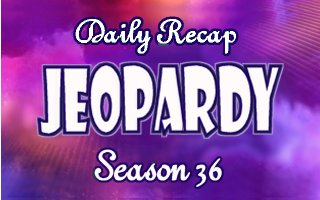
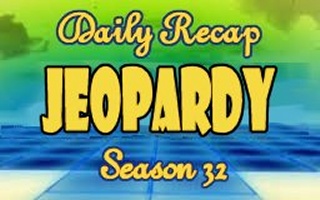
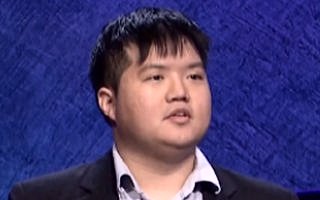
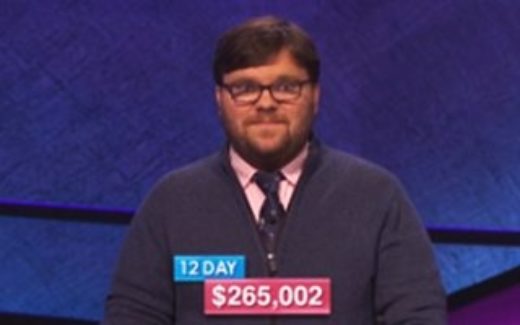
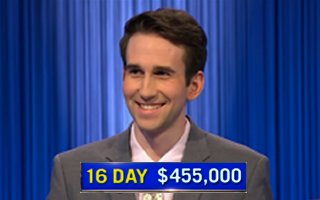
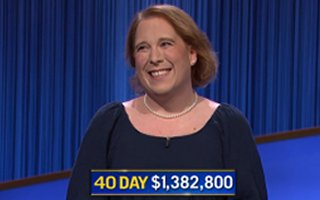

Well the question was “a restaurant chain took its name from…this 1967 song” so it wasn’t entirely clear if they wanted the chain name or the song name IMHO.
Jenn it was entirely clear…
“A restaurant chain took its name from a British band’s fourth chart-topper, THIS 1967 song.” And “Ruby Tuesday” is the name of that song, not “Goodbye Ruby Tuesday”. Another random, bad call on Jeopardy’s part.
The answer “Goodbye Ruby Tuesday” is an incorrect answer and should not have been given credit. The answer is just “Ruby Tuesday”. Even the contestant was shaking his head thinking that he got it wrong.
How can Jeopardy accept this as an acceptable answer when they wouldn’t accept the “Emancipation Proclamation” answer during kids tournament? That kid had one letter wrong and no one in this great nation thought the answer was anything else but Emancipation Proclamation.
I’m surprised “Goodbye Ruby Tuesday” was acceptable, since it’s not the name of the song or the restaurant chain. Haven’t F J answers been ruled out for things like minor misspellings?
Maybe someone knows the definitive answer. I’m just guessing that as long as what they have on there contains the whole answer, the extra word doesn’t matter.
Minor misspellings that don’t change pronunciation are generally accepted. When they make the answer a plural, for example, and it shouldn’t be or when they add a letter that creates an extra syllable, that is when they usually get dinged on spelling.